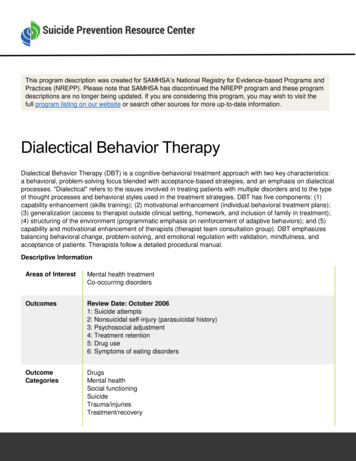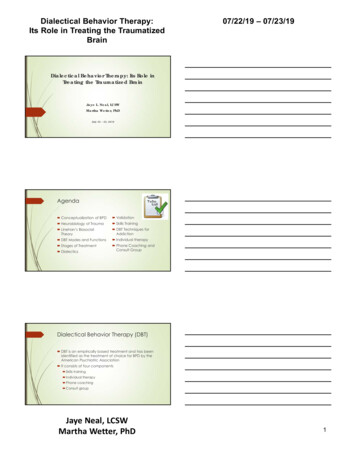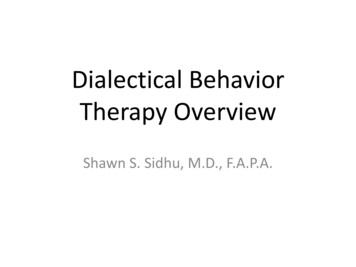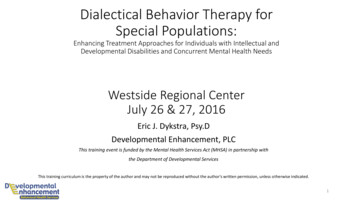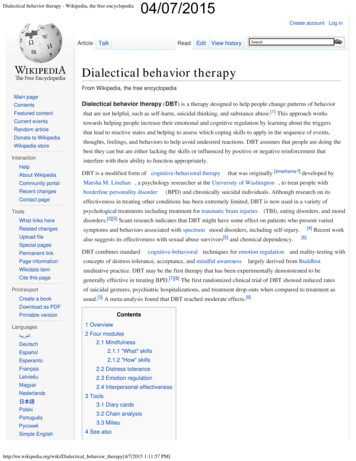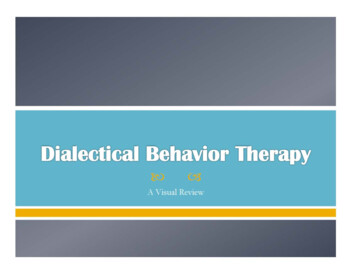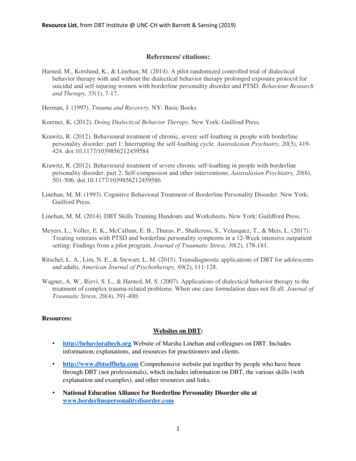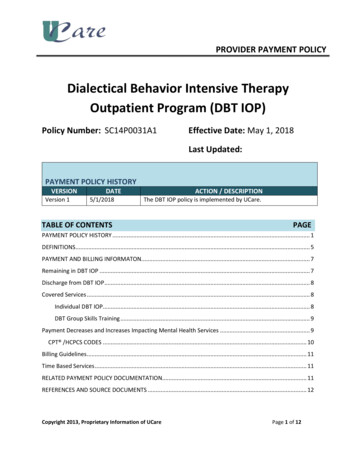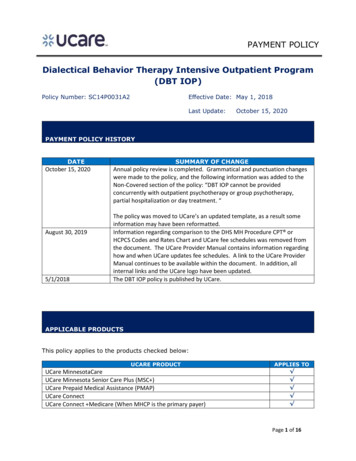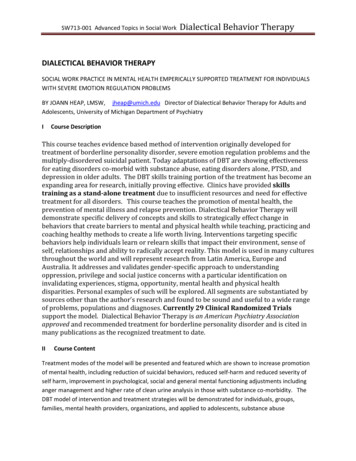
Transcription
SW713-001 Advanced Topics in Social WorkDialectical Behavior TherapyDIALECTICAL BEHAVIOR THERAPYSOCIAL WORK PRACTICE IN MENTAL HEALTH EMPERICALLY SUPPORTED TREATMENT FOR INDIVIDUALSWITH SEVERE EMOTION REGULATION PROBLEMSBY JOANN HEAP, LMSW, jheap@umich.edu Director of Dialectical Behavior Therapy for Adults andAdolescents, University of Michigan Department of PsychiatryICourse DescriptionThis course teaches evidence based method of intervention originally developed fortreatment of borderline personality disorder, severe emotion regulation problems and themultiply-disordered suicidal patient. Today adaptations of DBT are showing effectivenessfor eating disorders co-morbid with substance abuse, eating disorders alone, PTSD, anddepression in older adults. The DBT skills training portion of the treatment has become anexpanding area for research, initially proving effective. Clinics have provided skillstraining as a stand-alone treatment due to insufficient resources and need for effectivetreatment for all disorders. This course teaches the promotion of mental health, theprevention of mental illness and relapse prevention. Dialectical Behavior Therapy willdemonstrate specific delivery of concepts and skills to strategically effect change inbehaviors that create barriers to mental and physical health while teaching, practicing andcoaching healthy methods to create a life worth living. Interventions targeting specificbehaviors help individuals learn or relearn skills that impact their environment, sense ofself, relationships and ability to radically accept reality. This model is used in many culturesthroughout the world and will represent research from Latin America, Europe andAustralia. It addresses and validates gender-specific approach to understandingoppression, privilege and social justice concerns with a particular identification oninvalidating experiences, stigma, opportunity, mental health and physical healthdisparities. Personal examples of such will be explored. All segments are substantiated bysources other than the author’s research and found to be sound and useful to a wide rangeof problems, populations and diagnoses. Currently 29 Clinical Randomized Trialssupport the model. Dialectical Behavior Therapy is an American Psychiatry Associationapproved and recommended treatment for borderline personality disorder and is cited inmany publications as the recognized treatment to date.IICourse ContentTreatment modes of the model will be presented and featured which are shown to increase promotionof mental health, including reduction of suicidal behaviors, reduced self-harm and reduced severity ofself harm, improvement in psychological, social and general mental functioning adjustments includinganger management and higher rate of clean urine analysis in those with substance co-morbidity. TheDBT model of intervention and treatment strategies will be demonstrated for individuals, groups,families, mental health providers, organizations, and applied to adolescents, substance abuse
Dialectical Behavior Therapydisordered persons, eating disordered persons, developmentally delayed individuals, older adults withdepression and personality traits, women experiencing domestic violence, persons in inpatient andpartial hospitalization settings for adults and adolescents, persons and staff in forensic settings. DBTinstruction will target the underprivileged, invalidated populations of all particular cultures and willprovide specific methods for people to be empowered and agents of change within a community.Students will develop and have opportunity to assess and determine for themselves the value of havingthe knowledge of this comprehensive treatment model.IIICourse Objectives1) Demonstrate professional use of self using dialectical strategies of irreverent/reciprocal with clientgroups and colleagues.2) Demonstrate ability to integrate social work values, ethical standards and principles unique to DBTinvolving diverse populations including multiple psychiatric diagnoses and medical complications.3) Compare two evidence based practices and know how they have become more similar over time.4) Be able to give an example of how DBT assumptions about patients and therapy effect race/ethnicity,national origin, gender, age, height, weight, marital status, socioeconomic status, sexual orientation,gender identity, gender expression, disability, immigration status, faith/spirituality, veteran status, andthe therapy team.5) Be able to give an example of how the knowledge of oppression, discrimination, and historicaltrauma of a client group can guide or has guided the development of Dialectical Behavior Therapy.6) Be able to give an example of how to critically use Dialectical Behavior Therapy concepts and skills.7) Be able to use Dialectical Behavior Therapy model’s synthesis in theories of human behavior andsocial environment with the use of DBT validation strategies.8) Understand how a person would communicate to an insurance company the benefits of funding DBT.Be able to describe the benefits of providing a DBT skills group to a psychiatric clinic and a medical clinic.Describe use of commitment strategies in DBT model to engage with clients/patients.9) Describe in what context DBT was developed and how it has spread to treat many more situationsthan first intended and in which countries and cultures it is popular and effective.10a) Be able to identify and demonstrate the commitment strategies in DBT that facilitate alliancesbetween client and therapist and motivate change while cultivating hope in light of a client’sambivalence.10b) Be able to identify the characteristics found in a multi-dimensional comprehensive assessment thatmight suggest that DBT is an appropriate treatment for the client.10c) Be able to identify what problems might be presented to suggest that a helpful intervention couldbe found in Mindfulness module, Emotion Regulation module, Interpersonal Effectiveness Module orDistress Tolerance module. Know how diversity affects the choice of the intervention.10d) Be able to apply DBT diary card and chain analysis methods to evaluate the efficacy of yourDialectical Behavior Therapy interventions.SW713-001 Advanced Topics in Social WorkWinter 2015jheap@umich.eduPage 2
Dialectical Behavior TherapyIVCourse DesignThe course will include lectures, discussion, role play, video, articles, guest speakers, writtenassignments, tests, group projects and mindfulness activities.VRelationship to Curricular Themes:1. Theme Relation to Multiculturalism & Diversity: Mental health issues of personality and emotionaldysregulation are identified as barriers throughout the world. This course will explore the access andeffectiveness of Dialectical Behavior Therapy impact on and improvement of treatment for persons ofvarious cultural norms, sexual orientation, poverty, and ethnicity.2. Theme Relation to Social Justice: Forensic settings are embracing the model of Dialectical BehaviorTherapy in many settings to rehabilitate persons with psychiatric disabilities who have been deniedadequate treatment and skills training in order to manage outside the institution without recidivism.Persons who have mental illness have often lacked education opportunities, adequate employment,adequate housing and financial assistance.3. Theme Relation to Promotion, Prevention, Treatment and Rehabilitation: the effectiveness ofDialectical Behavior Therapy on reduction of stigma, preventing repeating generations of dysfunction,increase of treatment facilities contributing to rehabilitation and productivity will be discussed via thelatest research studies and guest speaker.4. Theme Relation to Behavioral and social Science Research: Randomized clinical trials will be used todemonstrate the effectiveness of this behavioral treatment. Additional articles will be presented fromsocial studies research and behavioral research.5. Theme Relation to SW Ethics and Values: Radical Acceptance of Personality Disorder and evidencebased treatment have continued to reduce stigma of borderline personality disorder. Several famouspersons have recently disclosed their own disorder and recovery increasing hope and promoting thesocial work ethics and values. All of the assumptions of treatment and core belief and support ofindividual wise mind are in accord and promote social work ethics and values.6. Intensive Focus on PODS: This course integrates PODS and skills with a special emphasis on theidentification of theories, practice, and policies that promote social justice, illuminate social injusticesand are consistent with scientific and professional knowledge. Through the use of a variety ofinstructional methods, this course will support students developing a vision of social justice, learn torecognize and reduce mechanisms that support oppression and injustice, work toward social justiceprocesses, apply intercultural frameworks and strengthen critical consciousness, self-knowledge andself-awareness to facilitate PODS learning.SW713-001 Advanced Topics in Social WorkWinter 2015jheap@umich.eduPage 3
Dialectical Behavior TherapySUMMARY OF ASSIGNMENTS & EVALUATION1 Final grade criteriaThe final grade for this course will be based on the following scheme: Points EarnedA AAB BBC CCD DD-97 - 10094 - 9690 - 9387 - 8984 - 8680 - 8377 - 7974 - 7670 - 7367 - 6964 - 6660 – 63Exam I (30 Points)This exam will include material covered in the first part of the course. Material will be drawn from thereadings, class lectures, guest speakers, and other class-related activities. The format of the exam willinclude (but is not necessarily limited to) the following types of questions: multiple-choice, true/false,short answer, and essay.MINDFULNESS (10 Points) Lead a mindfulness practiceParticipate in Group Consultation (10 points)Ten worksheets completed (20 points)Respectful class engagement and willingness to participate (5 points)Paper 2-4 pages (25 points)following:integrate self and/or others with at least segments of two of the1) Give an example of yourself using dialectical strategies of irreverent/reciprocal with client groups andcolleagues.2) Give an example of using ethical standards and principles unique to DBT involving diversepopulations.3) Give an example of comparison of two evidence based practices and how they are alike and different.4) Give an example of how DBT assumptions about patients and therapy effect (select from:)race/ethnicity, national origin, gender, age, height, weight, marital status, socioeconomic status, sexualSW713-001 Advanced Topics in Social WorkWinter 2015jheap@umich.eduPage 4
Dialectical Behavior Therapyorientation, gender identity, gender expression, disability, immigration status, faith/spirituality, veteranstatus, (effect) the patient/client and you.5) Give an example of how the knowledge of oppression, discrimination, and historical trauma of aclient group can guide or has guided the development of Dialectical Behavior Therapy.6) Give an example of how you critically use Dialectical Behavior Therapy concepts and skills.7) Give an example of how Dialectical Behavior Therapy model combines theories of human behaviorand social environment in the validation strategies.8) Explain the way you would communicate to an insurance company the benefits of funding DBT.9) Describe in what context DBT was developed and how it has spread to treat what situations and inwhich countries.10) Identify the commitment strategies in DBT that facilitate alliances between client and therapist andmotivate change while cultivating hope in the light of the client’s ambivalence.10b) What are the clues found in a multi-dimensional comprehensive assessment that might suggestthat DBT is an appropriate treatment for the client?10c) What problems might be presented to suggest that a helpful intervention could be found inMindfulness module or Emotion Regulation module or Interpersonal Effectiveness Module or DistressTolerance module?10d) How could the diary card help you evaluate the efficacy of your Dialectical Behavior Therapyinterventions?Course policiesAttendanceStudents are required to attend class. A grade deduction will be made if more than two classes aremissed. Students are expected to obtain missed information from a fellow student who has attendedthe missed class.Disabilities StatementAny student who feels they may need an accommodation based on the impact of a disability shouldcontact me privately to discuss your specific needs. Please contact the Services for Students withDisabilities office at 734-763-3000 in room G664 Haven Hall to coordinate reasonable accommodationsfor students with documented disabilities. If you have a disability or condition that may interfere withyour participation in this course, please schedule a private appointment with me as soon as possible todiscuss accommodations for your specific needs. This information will be kept strictly confidential. Formore information and resources, please contact Services for Students with Disabilities office at numberabove.Academic integrityAll students are expected to know and comply with the academic integrity policies of the University OfMichigan and School of Social Work. All suspected violations will be referred to the Associate Dean forEducational Programs.SW713-001 Advanced Topics in Social WorkWinter 2015jheap@umich.eduPage 5
Dialectical Behavior TherapyTexts and Course MaterialsRequired: Second Edition DBT Skills Training Manual (2015) byMarsha M. Linehan. Guilford Press Second Edition DBT Skills Training Handouts andWorksheets (2015) by Marsha M. Linehan.Guilford Press Can be purchased as PDF downloadRecommended and used in lecture: Linehan, M.M. (1993). Cognitive Behavioral Treatment of Borderline PersonalityDisorder. New York: Guilford Press.Linehan, MM (1993). Skills Manual for Treating Borderline Personality Disorder.New York: Guilford Press.Linehan, M.M., Miller, A.L., Rathus, J.H. (2007). Dialectical Behavior Therapy withsuicidal Adolescents. New York: Guilford Press.Dimeff, L.A., Koerner, K. (2007). Dialectical Behavior Therapy in Clinical Practice.New York: Guilford Press.Koerner, K. (2012). Doing Dialectical Behavior Therapy, A Practical Guide.New York, Guilford Press.SW713-001 Advanced Topics in Social WorkWinter 2015jheap@umich.eduPage 6
Dialectical Behavior TherapyClass Schedule and Readings1. January 8, 2015 Read Chapters 1,2,3 in Second Edition DBT SKILLS TRAINING MANUAL: by Marsha Linehan.a.Lecture will include material from text “Cognitive Behavioral Treatment of BorderlinePersonality Disorder”, chapters 1 & 15. This is not required reading but very interesting. Topicsto notice include understanding personality disorder and assessment of suicide risk, diversityand cultural issues.2. January 15, 2015 Read chapters 4,5,6 (skip Part I Appendices) in Second EditionDBT SKILLS TRAININGMANUAL, by Marsha Linehan.b.Lecture will include material from text “Cognitive Behavioral Treatment of BorderlinePersonality Disorder”, chapters 2, 3 & 7. This is not required reading but is very interesting.Topics to notice are dialectical practice, biosocial theory relationship with sexual orientation,poverty, social justice and influence on treatments per researched articles. Dialectical dilemmas,walking the middle path, Mindfulness module. Give handouts pages 9 – 38. Student leads amindfulness practice.3. January 22, 2015 Read Chapter 7 Mindfulness in Second Edition DBT SKILLS TRAINING MANUAL byMarsha Linehan.c.Class discussion about mindfulness and handout sheets given from Second Edition DBT SkillsTraining Handouts and Worksheets. Give worksheets pages 39 – 108 for fun. Student leads amindfulness practice. Video?4. January 29, 2015 Read Chapter 9 Emotion Regulation in Second Edition DBT SKILLS TRAINING MANUAL byMarsha Linehan.d.Lecture will be from “Cognitive Behavioral Treatment of Borderline Personality Disorder”chapters 4,5,6. Topics to notice including target behaviors, assumptions, stages of treatment andconsultation team agreements. Group discussions. Student leads a mindfulness practice.Worksheets pages 197-312 from Second Edition DBT Skills Training Handouts and Worksheets.SW713-001 Advanced Topics in Social WorkWinter 2015jheap@umich.eduPage 7
Dialectical Behavior Therapy5. February 5. 2015 Review of Mindfulness and Emotion Regulation, Assumptions, dialectical concepts, BiosocialTheory, stages of treatment, modes of treatment, chain analysis, levels of validation and four mindfulness practicesled by students. Video?6. February 12, 2015 Read Chapter 8 Interpersonal Effectiveness in Second Edition DBT SKILLS TRAININGMANUAL by Marsha Linehan.e. Lecture on skills with handouts 109 – 195. Student leads Mindfulness practice. Modes.7. February 19, 2015TEST8. February 26, 2015 No specific reading assignment.Individual Therapy Topic. Commitment Strategies,Validation Strategies (from “Doing Dialectical Behavior Therapy” by Kelly Koerner ) Discussion and role play byscript from DDBT. Practice Chain Analysis together9. March 5, 201410. March 12, 2015NO CLASSRead Chapter 10 Distress Tolerance in DBT SKILLS TRAINING MANUAL by MarshaLinehanf. Lecture on skills with handouts pgs 313-41011. March 19, 2015Read Chapter 7 in “Doing Dialectical Behavior Therapy” by Kelly Koerner. On C-tools.Team work, handouts in class on team process and team consultation agreements. Mindfulness led by 2 students12. March 26, 2015 No reading assignment. Class discussion and role plays in all modules and in individualtherapy and in team work to increase overall understanding of the model.13. April 2, 2015 Phone consultation topic. Skim articles on C tools Lecture is discussion on phone consult andcontinued work on modules and individual therapy and group therapy and team consultation.14 April 9, 2015 Question and Answer period. Teams create and ask questions. Prizes awarded. Pros and consof class discussed with trouble shooting and correction and over corrections.15. April 16, 2015Paper DueSW713-001 Advanced Topics in Social WorkWinter 2015jheap@umich.eduPage 8
Dialectical Behavior TherapySW713-001 Advanced Topics in Social WorkWinter 2015jheap@umich.eduPage 9
Dialectical Behavior TherapySW713-001 Advanced Topics in Social WorkWinter 2015jheap@umich.eduPage 10
Dialectical Behavior Therapy on reduction of stigma, preventing repeating generations of dysfunction, increase of treatment facilities contributing to rehabilitation and productivity will be discussed via the latest research studies and guest speaker. 4. Theme Relation to Behavioral and soc
